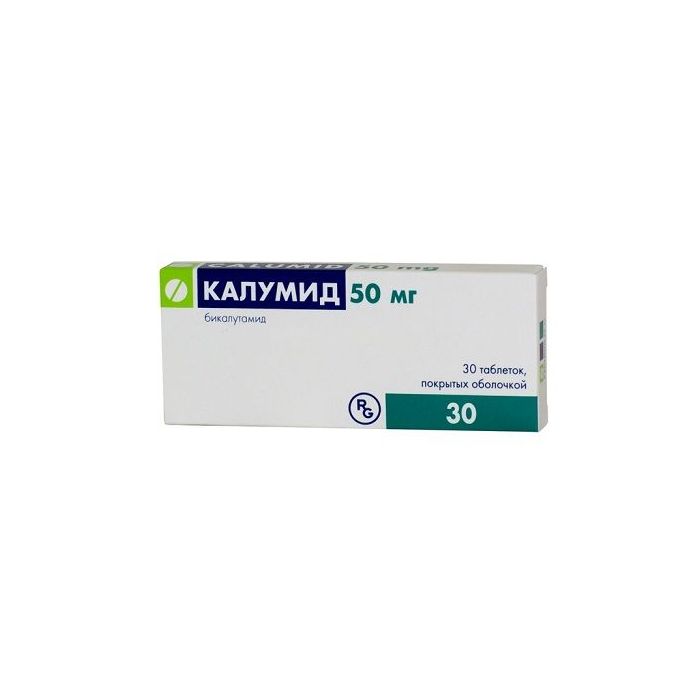Bykalutamyd | Kalumid tablets 50 mg, 30 pcs.
Special Price
$74
Regular Price
$86
In stock
SKU
BID463700
release form
Film-coated tablets
Packing
30 pcs
Pharmacological action
Kalumide - antiandrogenic non-steroidal drug. It is a racemic mixture, and the anti-androgenic activity is predominantly of the (R) -enantiomer. It does not have other types of endocrine activity. Binds to androgen receptors and, without activating gene expression, suppresses the stimulating effect of androgens.
The result of this is a regression of malignant neoplasms of the prostate gland. In some patients, discontinuation of bicalutamide may lead to the development of a clinical withdrawal syndrome of antiandrogens.
Pharmacokinetics
After oral administration, it is rapidly and completely absorbed from the gastrointestinal tract. Eating does not affect absorption.
(S) -enantiomer is eliminated from the body much faster than the (R) -enantiomer, the half-life of the latter is about 7 days.
With daily intake of the drug Kalumid®, the concentration of (R) -enantiomer in the plasma increases by about. 10 times due to the long half-life, which makes it possible to take the drug once a day.
When taking bicalutamide daily at a dose of 50 mg, the equilibrium concentration of: (R) -enantiomer in plasma is about 9 μg / ml. When taking 150 mg of bicalutamide daily, the equilibrium concentration of the (R) enantiomer is approximately 22 μg / ml. At equilibrium, about 99% of all enantiomers circulating in the blood are the active (R) -enantiomer.
The pharmacokinetics of the (R) enantiomer are not affected by age, impaired renal function, mild to moderate impaired liver function. There is evidence that in patients with severely impaired liver function, the elimination of the (R) -enantiomer from blood plasma slows down.
Communication with blood plasma proteins is high (for the racemic mixture 96%, for the (R) enantiomer 99.6%). It is intensively metabolized in the liver (by oxidation and the formation of conjugates with glucuronic acid). Metabolites are excreted by the kidneys and intestines in approximately equal proportions.
Indications
Common prostate cancer in combination with a GnRH analog (gonadotropin releasing hormone) or surgical castration.
Locally advanced prostate cancer (T3-T4, any N, M0 T1-T2, N +, M0) as monotherapy or adjuvant therapy in combination with radical prostatectomy or radiotherapy.
Locally advanced non-metastatic prostate cancer in cases when surgical castration or - other medical interventions are not applicable or unacceptable!
Contraindications
hypersensitivity to bicalutamide and / or other components of the
drug concomitant use with terfenadine, astemizole and cisapride
Kalumid should not be prescribed to women and children.
Precautions: impaired liver function, lactase deficiency, lactose intolerance, glucose-galactose malabsorption (the drug contains lactose).
Use during pregnancy and lactation
Contraindicated.
Composition
1 tablet contains:
Active ingredient:
bicalutamide 50 mg
Excipients:
silicon dioxide colloidal,
magnesium stearate,
povidone,
sodium carboxymethyl starch type A,
lactose monohydrate glycetol, 33 garate triacitrate .
Dosage and administration of
Adult men (including the elderly):
For advanced prostate cancer in combination with a GnRH analog or surgical castration: 50 mg orally once a day. Treatment with Kalumid should be started at the same time as the start of taking GnRH analog or surgical castration.
For locally advanced prostate cancer: 150 mg orally once a day. Kalumid should be taken for a long time, at least for 2 years. If signs of disease progression appear, the drug should be discontinued.
Impaired renal function: dose adjustment not required.
Dysfunction of the liver: with mild impairment of liver function, dose adjustment is not required. In patients with moderate to severe impaired liver function, an increased accumulation of Ka may be observed.lumide.
Side effects
From the cardiovascular system: heart failure.
From the digestive system: anorexia, dry mouth, dyspepsia, dysphagia, constipation, flatulence.
From the nervous system: dizziness, headache, insomnia, increased drowsiness.
From the respiratory system: shortness of breath.
From the urinary system: nocturia, polyuria.
From the hematopoietic system: anemia, leukopenia.
From the skin and its appendages: alopecia, rash, excessive sweating, hirsutism.
On the part of laboratory parameters: hyperglycemia, increased activity of "liver" transaminases.
Other: abdominal pain, chest pain, pelvic pain, decreased or increased body weight, edema, diabetes mellitus, fever.
Drug Interaction
There are no data on the pharmacokinetic or pharmacodynamic interactions between bicalutamide and GnRH analogues.
In vitro studies have shown that the (R) -enantiomer of bicalutamide inhibits CYP ZA4 to a lesser extent by affecting CYP 2C9, 2C19 and 2D6 activity. Potential ability of bicalutamide to interact with other drugs has not been detected, however, when using bicalutamide for 28 days, amid midazolam administration, the area under the concentration-time curve (AUC) of midazolam increases by 80%.
Incompatible with terfenadine, astemizole, cisapride.
Caution should be exercised when prescribing Calumide at the same time as cyclosporine or calcium channel blockers. The dose of these drugs may need to be reduced, especially in case of potentiation or adverse events. After initiation of use or discontinuation of the drug Kalumid, it is recommended to carefully monitor the plasma concentration of cyclosporine and the clinical condition of the patient.
The concomitant use of Kalumide and drugs that inhibit the microsomal oxidation of drugs, such as cimetidine or ketoconazole, may increase the concentration of Kalumide in the blood plasma and possibly increase the incidence of side effects.
Enhances the action of coumarin anticoagulants, including warfarin (competition for protein communication).
Overdose
There have been no cases of overdose in humans. There is no specific antidote.
Treatment is symptomatic.
Dialysis is not effective, as bicalutamide binds strongly to proteins and is not excreted by the kidneys unchanged. General supportive therapy and monitoring of vital functions of the body are shown.
Storage conditions
Store at a temperature not exceeding 30 РC.
Expiration
5 years.
Deystvuyuschee substances
Bykalutamyd
dosage form
dosage form
tablets
Submit your review to Earn 10 Reward Points click here to login
Write Your Own Review

